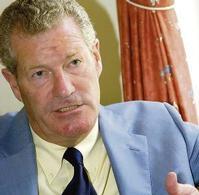Byron Buckley, News Editor

Peter Mathers, British High Commissioner. - NORMAN GRINDLEY/DEPUTY CHIEF PHOTOGRAPHER
FUNDING IS available from the European Union (EU) to diversify Jamaica's sugarcane sector, according to Peter Mathers, the outgoing British High Commissioner to Jamaica.
The largely state-controlled sugar industry has been propped up by a preferential pricing and quota arrangement with European countries under a 1975 Sugar Protocol. An attempt by government to divest sugar factories during the 1990s failed, with the factories later returning to state ownership. The industry continues to hobble along.
Mathers told the Financial Gleaner on Wednesday that more than year ago the British Department for International Development conducted a study of the possible uses of sugar cane and cane lands other than producing sugar. One of the possibilities, the high commissioner noted, was the production of ethanol for fuel from cane.
"This (financing the alternative use of cane/lands) is what we are encouraging the European Commission to do, because there will be some money available for transitional and longer term use of these lands," said Mathers.
His disclosure comes on the heels of the EU's formal proposal to reduce by 39 per cent over four years the price at which it imports sugar from producers in the 18-member African Caribbean and Pacific (ACP) grouping. The proposal has fuelled long held fears about the likely demise of the local sugar industry on the removal of protection.
During the announcement of the price cut on Wednesday, the European Commission (EC) - the administrative arm of the EU - also disclosed plans to assist ACP sugar producers to reform their industries over an eight year period. The assistance would commence next year with the provision of a $3 billion fund for ACP countries for one year, with further assistance subject to negotiation.
VIABILITY
In recent years no less than two studies have been done on the future viability of the sugar industry, which could be dusted off and form the basis of an investment project plan.
"I think what is needed is for somebody to come forward with a specific proposal, whether it be from the Jamaican side or the European side, for alternative use (of cane lands)," said the British High Commissioner.
Mathers, who ends his tour of duty in July, said he has taken British officials on visits to some of the cane growing areas for them to see the nature of the potential problem if there is a fallout in the sugar industry.
"We are heavily engaged with the Jamaican authorities in addressing problems of poverty and law and order," he pointed out. "It therefore does not suit our agenda at all for people to be losing their jobs and to be joining the ranks of the unemployed and obviously contributing to the problem of poverty we all are trying to work together to solve."












